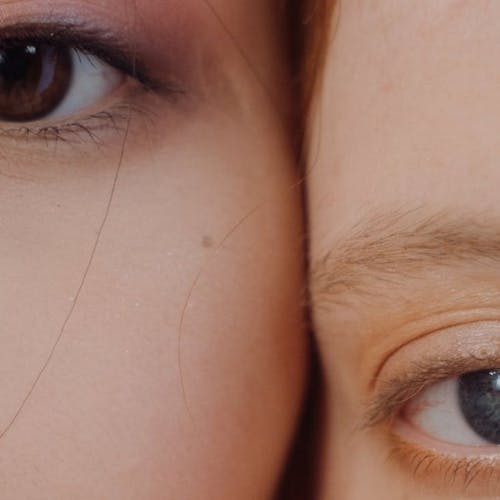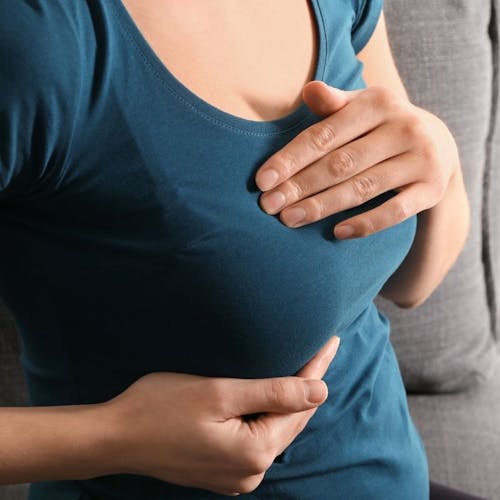This website uses cookies to enhance the user experience. By using Yoppie you are agreeing to our use of cookies.
What's Up With Sore Boobs Before Your Period?
Written by Yoppie
23 Jul 2021
Why do my boobs hurt before my period?
What causes breast pain?
Should I be worried about breast pain?
How do I check for breast lumps?
What do I do if I think something is wrong?
Can anything else cause breast pain?
How do I handle painful boobs?
Periods bring on a lot of annoying symptoms every month, but one of the most irritating has to be breast pain. Breast pain can occur just before your period, during your period or at pretty much any other point in your cycle. Your breasts might feel achy, heavy, tender and discomfort may even affect your daily activities or make it hard to sleep.. Here, we’re helping make sense of why you get breast pain, how to know if it’s something to worry about, and how to cope with it.
Why do my boobs hurt before my period?
Premenstrual breast swelling and tenderness is known as ‘cyclical mastalgia’, and it’s very common for people with periods who suffer with PMS (premenstrual syndrome).
If you find your boobs hurt a lot before your period, it may be a sign of fibrocystic breast disease, which is when breasts become painful and lumpy before menstruation. The lumps can be large and may move when you push them, but they’ll usually go away when your period is over. If they don’t stop hurting after your period, you’ll need to check them with a doctor, but we’ll get to that later.
Breast pain ranges in its intensity; mostly it is mild and more of a discomfort, but in some cases it can be severe and require intervention. Typically breast pain occurs alongside PMS symptoms before a period comes on, but some people experience it at other times in their cycle too. If your breast pain happens near your period, you’ll notice it goes away when you start to bleed. Ah, the relief.
What causes breast pain?
It’s those pesky hormones again. Fluctuating hormone levels are usually the reason for premenstrual breast pain. Oestrogen and progesterone both increase in the second half of the cycle. Oestrogen hits a peak mid-cycle, while progesterone levels peak around a week before menstruation. The oestrogen enlarges the breast ducts, and the progesterone causes glands to swell, so with all that happening your breasts can get pretty sore.
Should I be worried about breast pain?
Generally, no. Breast pain is a pretty normal PMS symptom, but it’s good to know the signs of something else, just in case. It’s easy to jump to the conclusion of breast cancer whenever anything is painful or lumpy, but try not to worry as in the majority of cases it’s nothing.
Any unexplained breast pain that doesn't leave after one or two menstrual cycles, that continues even after menopause, or that doesn't follow your regular hormone changes, should be checked by your GP to make sure it’s nothing to worry about.
How do I check for breast lumps?
Get familiar with checking your breasts for lumps on a regular basis, as everyone’s breasts are different in size, shape and feel, and only you will know if and when yours change. Your breasts will feel different when you are ovulating to when you are menstruating, and remember it’s also normal for one breast to be larger than the other. If you have gone through the menopause, your breasts may feel softer and not as lumpy.
The NHS Breast Screening Programme recommends looking at your breasts and feeling each breast and armpit all the way up to your collarbone. Use a circular motion with a firm but smooth touch, and keep fingers flat and together. It’s sometimes easiest to do this and feel for any changes while you’re soaped up in the shower or bath.
You’ll want to use light pressure for the skin and tissue just beneath, medium pressure for tissue in the middle, and firm pressure for the deeper tissue, where you should also be able to feel your ribcage.
When looking at your breasts, do this in the mirror with your arms on your hips, and again with your arms raised up. Here are a few things to look out for:
- Dimpled, puckered, or bulging skin on the breasts
- A nipple that looks like it has changed position or been pushed inward instead of out
- Any redness, rashes or swelling
- Fluid coming out of one or both nipples, which could be watery, milky, yellow or bloody
What do I do if I think something is wrong?
It’s important that you don't panic about a lump, because most are completely normal. Breasts are naturally a little lumpy so it’s usually nothing out of the ordinary if you come across one that you don’t recognise.
Still, you need to get any strange lumps checked over by your doctor, as they can do a more thorough examination, and if they think you need to have more tests done, they’ll talk you through the next steps such as a possible ultrasound or a mammogram.
Can anything else cause breast pain?
Breast pain may also be caused by things like a clogged milk duct, mastitis (an infection that can come from breastfeeding), having larger, heavier breasts, having had breast surgery in the past, and taking hormonal medications. If you think your breast pain may be caused by something other than PMS symptoms, speak to your doctor and check them over.
How do I handle painful boobs?
Sore boobs shouldn’t affect your daily life, so take steps to address any pain each month so you don’t need to change the way you live. You may want to try sleeping in a different position, getting fitted for a bra while you have swollen breasts to get the most comfortable option, buying a more supportive sports bra for working out, or speaking to your doctor about changing your birth control to see if this makes a difference. Your doctor may also suggest reducing your sodium, taking calcium supplements, or if you have intense pain, trying estrogen blockers or pain relievers to alleviate the discomfort.
Got a question about breast pain or lumps? Feel free to reach out in our private Facebook group or drop us a note on Insta @itsyoppie; and if you come across a breast lump, don’t put off speaking to your GP to make sure everything is A-OK. Don't forget that our personalised period box can get organic tampons, hormonal supplements and more delivered easily and regularly through your letterbox, so that's one load off your mind about everything that normally goes on down there.
Section jump
Back to top
Subscribe To Our Newsletter
YOPPIE





© 2026 Yoppie is a registered trademark of Phlo Technologies Ltd.
Yoppie's supplements are not a substitute for a varied diet and healthy lifestyle and are not intended to diagnose, treat, or cure any disease. If you are pregnant, breastfeeding, have a medical condition or are under medical supervision, please consult with your doctor before taking any of our products.






